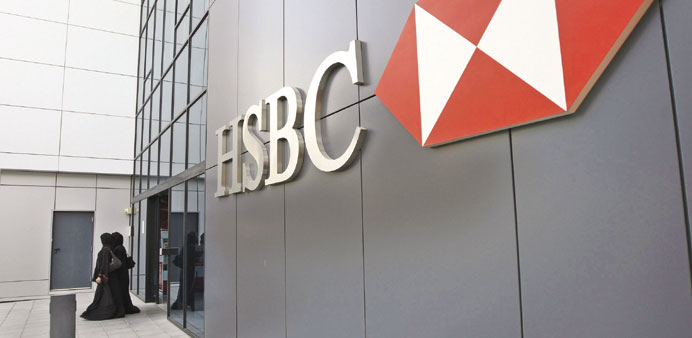Women walk out of a branch of HSBC at Dubai Internet City (file). HSBC’s UAE Purchasing Managers Index rose in April to the highest level in at least five years.
Bloomberg/Dubai
UAE borrowers will help revive regional sukuk sales this year from the slowest start since 2011 as the economy gains strength, according to HSBC Holdings, the biggest arranger of deals in the market.
“The UAE will be the biggest contributor to issuance before the end of the second quarter,” Mohammed Dawood, Dubai-based global head of sukuk financing for HSBC, said by phone from Doha recently. Full-year sales in the six-nation Gulf Co-operation Council could match or “slightly” exceed last year’s $21.2bn, he said.
Recoveries in real estate, trade and tourism in the second-biggest Arab economy are fuelling a rebound in growth, leading the International Monetary Fund to consider raising its 2014 forecast. With borrowing costs falling, Dubai sold debt last month for the first time in more than a year, boosting Shariah-compliant issuance from the region to $6.7bn, according to data compiled by Bloomberg. Sales remain 29% lower than this time last year, the figures show.
The yield on Middle East sukuk has declined 39 basis points this year to 4.26%, the lowest in almost a year, according to JPMorgan Chase & Co indexes. That compares with a drop of 34 basis points for non-Islamic debt in the region.
The IMF has said it will probably raise its estimate for economic growth in the UAE this year from 4.4% as Dubai’s expansion gathers pace. HSBC’s UAE Purchasing Managers Index rose in April to the highest level in at least five years, the bank said on May 6.
UAE issuers “will probably be a mix of first time borrowers and the usual suspects,” Dawood said. “While levels were limited in the first quarter, it suggests that there’s strong pent-up demand for issuance.”
HSBC expects bond and sukuk issuance in the region of as much as $40bn this year, almost matching last year’s, Mustafa Aziz Ata, head of Middle East and North Africa debt capital markets at the London-based bank, said in an interview in Dubai recently.
Sales are off to a slow start this year as borrowers opted for loans, Dawood said. Syndicated Islamic facilities in Europe, the Middle East and Africa rose 77% this year to $2.8bn, according to data compiled by Bloomberg.
Dubai Investments Park, a subsidiary of Dubai Investments, sold a $300mn sukuk in February, one of three sales in the first three months of the year. Damac Real Estate Development Ltd, the Dubai-based developer, raised $650mn from the sale of its first sukuk in April.
“There are a number of first time issuers seeking to access” the sukuk market, Dawood said, declining to be more specific. The sales “will encourage other debut issuers to come to the market,” he said.

